Steven Lyle Jordan's Blog, page 35
December 18, 2014
Seriously: Enclosed ecosystems
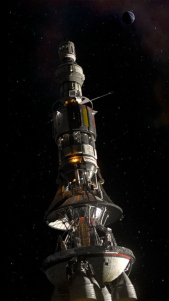 The SyFy miniseries Ascension has reminded me of the biggest—really, the absolute biggest problem facing missions to other planets and isolated human colonies (and the real reason why the Ascension mission would never have worked in 1963).
The SyFy miniseries Ascension has reminded me of the biggest—really, the absolute biggest problem facing missions to other planets and isolated human colonies (and the real reason why the Ascension mission would never have worked in 1963).
It’s the fact that we don’t know how to create and maintain a closed, sustainable ecosystem. And if you don’t have one of those, I don’t care what else your long-range mission has… it’s doomed to fail.
In Ascension, hundreds of colonists are (supposedly) on a 100-year mission to Proxima Centauri. This means that the ship is supposed to provide its own recyclable atmosphere, its own food, fuel and other supplies, from only the things they have on-board, for 100 years. This is a conceit that science fiction has been hawking for years, usually making it look easy to keep sealed environments going on their own. But the truth is not nearly so convenient: Maintaining sealed ecosystems is damned complicated and damned hard.
And though it’s rarely talked about outside of die-hard engineers, we’ve never managed to create such a closed and sustainable ecosystem. Not even today.
At present, any humans that want to work in space have to take all of their supplies with them. Even air. There is some ability to recycle some chemicals, including air and water; but it is limited and imperfect. Sooner or later, even the best-maintained mission is going to have to import supplies, from the most specialized and complex, down to air and water, in order to survive. Or they’ll have to come home.
Knowing this, scientists have attempted to create sealed and sustainable test environments, to make sure humans can survive over long periods. The idea is to use these as a guide for creating sustainable environments in places where we can’t simply ship fresh supplies to them every few months… like Mars, or other long-range destinations.
 The most famous, Biosphere 2, created a sealed environment, with its own agriculture and supporting animals, and eight people attempting to live inside it on its first mission. (I repeat: Eight people. Look at the size of it.) But the experiment was considered a failure, owing primarily to wildly fluctuating CO2 levels, severely-dropping oxygen levels, and the death of most of the vertebrate species and all of the pollinating species. (A second mission was ended prematurely because of external management issues and vandalism by members of the first mission.)
The most famous, Biosphere 2, created a sealed environment, with its own agriculture and supporting animals, and eight people attempting to live inside it on its first mission. (I repeat: Eight people. Look at the size of it.) But the experiment was considered a failure, owing primarily to wildly fluctuating CO2 levels, severely-dropping oxygen levels, and the death of most of the vertebrate species and all of the pollinating species. (A second mission was ended prematurely because of external management issues and vandalism by members of the first mission.)
BIOS-3, an experimental Russian facility, had some success with 2-3-man habitats that aggressively recycled materials, but it was not 100% sealed. Other experiments have also attempted to mimic sealed environments, but at less than 100% of actually being sealed.
So far, no one or group has found a way to generate a fully sealed and recyclable environment for long-term human use. The incredible chemical complexities of maintaining atmosphere and producing sustaining food and water are still beyond our abilities to master, or even fully understand.
All of that means that if we’d actually launched a ship like Ascension in 1963… it’s occupants would probably all be dead by 1965. So, in a way, it was clever of Ascension to admit to audiences that “we can’t send a sustainable community to space today, so we’ll just have to pretend in order to see what happens.”
But we will have to continue to experiment on sealed habitats and what it will take to maintain them; otherwise, our future space program will be forever limited to the reach of a live supply train of goods and essentials to keep our explorers alive.

December 13, 2014
$1.99. Yes.
December 12, 2014
All about that space
December 11, 2014
Replacing keys with handwavium?
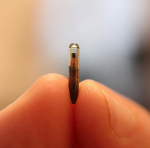 I’ve spoken before about my loathing of that 500-year-old technology, the lowly key: How I am so tired of depending on this ancient, easily-defeatable technology to secure my property; about how tired I am of carrying a pocketful of them with me everywhere I go, inevitably putting holes in my back pocket, in order to enter my car, to unlock my home, to give me entrance to my office, to lock up my bike, etc, etc.
I’ve spoken before about my loathing of that 500-year-old technology, the lowly key: How I am so tired of depending on this ancient, easily-defeatable technology to secure my property; about how tired I am of carrying a pocketful of them with me everywhere I go, inevitably putting holes in my back pocket, in order to enter my car, to unlock my home, to give me entrance to my office, to lock up my bike, etc, etc.
The device pictured here proves that now, in the 21st century, it doesn’t have to be that way anymore.
The device is a chip with Near-Field Communications (NFC) technology loaded on it. It can be read by a radio signal, and is capable of transferring data between itself and a transceiver. Do you own a car that can be opened and started without a key, operated by a radio fob that never even leaves your pocket or purse? This tiny chip works the same job as that fob. And because it doesn’t actually need to touch the lock, it can be placed anywhere that puts it in proximity of the lock.
Like under your skin.
Above is an X-ray of two such chips embedded within the flesh of the hand. (Yes, more and more people are trying this out, right now.) Remember all those old sci-fi movies and shows, where someone would approach a door, wave their hand, and the door would open for them as if it recognized that hand? Then someone else would approach, wave their hand, and nothing would happen? You are looking at a way to be that cool sci-fi guy, opening things and turning things on… with handwavium, of a sort.

Klaatu waving his hand to log into Google+
NFC-embedded chips could be a secure way to access locks without cumbersome keys that can be easily copied, ridding our reliance on locks that can be easily picked. And a distinct advantage the chip has over a key is that the one chip can be programmed to access many locks securely. Say… thousands.
It would work much the same as a key fob system: The transmitter and the chip synchronize with each other, and generate a rolling code (a 40-bit code generator, used in standard car key fob systems, creates a number from a trillion possible codes) that each side shares. The next time they connect, the transmitter will ask the chip for the code, and will only respond if it receives the right code.
Add to the chip the ability to recognize distinct signals from many devices, and only send the appropriate code for that device, and you have a single chip that can open as many locks as you can program into it.
Now let’s think beyond the typical key: The chip could also send unlock signals to electronic devices you own, and passwords for individual pieces of software, websites, credit card authorizations, ATM machines, etc. If you thought ridding yourself of a few keys might be nice… imagine ditching all of those passwords you’ve memorized (or, more likely, written down somewhere). It could even be given temporary access to things like hotel rooms or rental vehicles as desired.
And it could include comprehensive personal emergency information that a medical facility could access in the event that you were injured or incapacitated. A medical team with a scanner would be able to find out about any pre-existing medical conditions, drugs prescribed, allergies, etc, that could mean life or death in an emergency.
Personally speaking, if I could get rid of the keys to my house, car, office, bike lock, gym locker, etc, etc… as well as the passwords to a few-score websites and bank accounts… and emergency medical data just in case… by being able to just wave my hand over a lock or device… hell yes, sign me up. And I’ll bet the farm that I won’t be the only one to say “yes” to such a convenience.
At this point, I can naturally hear all of the security paranoids and conspiracy theorists, screaming that this only provides another way for “The Man/Big Brother/The Gubmint” to keep track of your every move. My considered response to this concern is:
Heh.
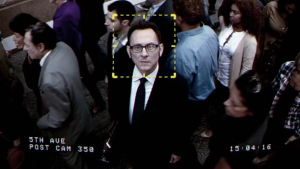 First of all, I’ll point out that “The Man/Big Brother/The Gubmint” and corporate, retail and just plain nosy organizations besides can already keep track of you, every time you use a cellphone, pay a transaction with plastic, log into a site or network on your computer, step in and out of offices and stores, and even walk down the street. If that’s really what you’re concerned about… that ship’s already sailed, Winston.
First of all, I’ll point out that “The Man/Big Brother/The Gubmint” and corporate, retail and just plain nosy organizations besides can already keep track of you, every time you use a cellphone, pay a transaction with plastic, log into a site or network on your computer, step in and out of offices and stores, and even walk down the street. If that’s really what you’re concerned about… that ship’s already sailed, Winston.
(We’ll bypass the fact that just because they can watch you, doesn’t mean you’re important enough to the understaffed and overtaxed “The Man/Big Brother/The Gubmint” for them to be bothered with watching you. And they call me paranoid…)
And second, the point behind the chip is that it is not designed to transmit its signal for more than a few inches, or even less; meaning you will need either very close proximity, or even actual contact, to use it. And it’s not designed to give up its information to any transmitter that doesn’t possess the recognized request signal AND the proper 40-bit trillion-possibilities code.
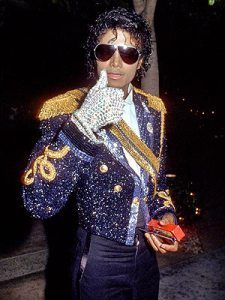
Michael Jackson: Chipped before it was cool.
But if you’re really worried, I suppose you could block any radio signals until you’re ready to send/receive them, by wearing an RFID-blocking fabric over the chip. Stainless steel threads are often sewn into wallets to protect the credit cards and passports therein; they can also be sewn into sleeves, gloves, wristbands, etc, as needed. Keep it on over the chip until you want it to be detectable, then pull it back, unlock your lock, and slide it back on. (Well, well… who knew Michael Jackson was an early adopter?)
And you’d probably need a way to verify the chip was owned by the user, and not (ugh) cut out of one person and embedded into another. Maybe the chip would be designed to stop responding in the event of tissue trauma (a significant change in surrounding body signals, heat or conductance caused by removal of the chip) and require specific biometric data to be input to unlock it.
I foresee a future world of RFID locks embedded into all kinds of hard lock systems, computers, ATMs, personal devices, almost everything large enough to hold a battery (or even a solar cell) and a non-volatile memory. The chips would be implanted under the skin, probably in your hand, wrist or forearm—feel free to be kinky about where you put yours, but sooner or later grammy’s gonna know you’re opening doors by twerking, and the fallout’s on you.
Users would be synchronized with the locks either when buying them/introduced to them (using equipment at the lock’s location or controlled by the retailer) or remotely, possibly through a cellphone or computer connection. The user could also provide some biometric data to provide extra security at the time of synchronization, or even in daily use. Instead of having spare keys made (for relatives, the babysitter, etc), you would bring the person in and synchronize them with your lock through a master control system that only you as the owner, or maybe a locksmith, could use.
You would then go about your day, and appropriate locks would open in your proximity, or possibly when you brush against them. If you aren’t set up for a lock, it’s not opening. Period. Some might wear an RFID sleeve over the chip for extra security, and remove it only when they want to use the chip.
And the world would not only be free of slabs of shaped metal bulking up everyone’s pockets: The world would be a more secure place, an easier world to navigate, a world unencumbered by collections of easily-guessed or easily-forgotten passwords. A world where you are your key and your password.
And the physical key would finally, deservedly, be equated with quaint old technology, romantically revered by modern society, like… quill pens. And sextants. And fire.

December 9, 2014
Definitions of science fiction
I’m just going to leave these here.
Isaac Asimov. 1975: “Science fiction can be defined as that branch of literature which deals with the reaction of human beings to changes in science and technology.”
John W. Campbell, Jr. 1947: “To be science fiction, not fantasy, an honest effort at prophetic extrapolation from the known must be made.”

War on Christmas?
 This time of year brings out the usual “war on Christmas” comments… what’s wrong with saying “Merry Christmas”? Everybody loves Christmas! Why not say so?
This time of year brings out the usual “war on Christmas” comments… what’s wrong with saying “Merry Christmas”? Everybody loves Christmas! Why not say so?
Actually, some people ARE offended that one holiday is given so much attention (not to mention the one day apparently celebrated from November 28th through January 1st), while other holidays–their holidays–are ignored. And especially given Christianity’s spotty humanitarian history and mythology.
So I totally understand non-Christians being tired of the largest group shouting them down for a month, and wanting to see a little respect for their own traditions.
It’s just being polite… like when Jews, for instance, don’t throw menorahs in your face and demand you speak in Hebrew to them for a week.
So lighten up, Christians. This is not a war. It’s a plea for peace and understanding for all men. Sound familiar?

December 8, 2014
Steven Lyle Jordan
An artisan author who has written fifteen original novels over the past decade; Steven Lyle Jordan’s passions for science, technology and their impact on our society and our future are reflected in his original futurist fiction and sci-fi novels.
Many of the books are available in ebook formats at Amazon and at Barnes & Noble.

December 6, 2014
Wanderers
December 4, 2014
NASA’s Orion: This is innovation?
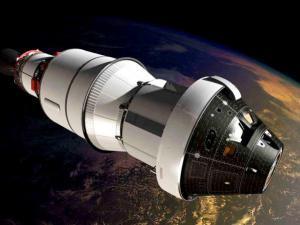 As of this posting, NASA has scrubbed for today its test-launch of the first Orion spacecraft, the ship destined to take astronauts back to the Moon, to orbit, and eventually, to Mars.
As of this posting, NASA has scrubbed for today its test-launch of the first Orion spacecraft, the ship destined to take astronauts back to the Moon, to orbit, and eventually, to Mars.
NASA’s design of the Orion should look familiar to any space buff: It’s the Apollo design, part deux. Naturally, NASA has updated the technology in the Orion, and even made it bigger (to hold one more astronaut). Their theory is that this really is a better way to get astronauts to space than the Space Transport System (aka the Space Shuttle), which did suffer two complete failures in its history, with the loss of all crew members (actually not a bad performance record, out of 135 missions to space), and had no provision for emergency egress (its only really damning feature).
Even so, today’s scrub of the test-launch was caused by two faulty valves in the fuel system… leading one to wonder whether building Orion after the “familiar, but upgraded” Apollo tech was really the way to go.
Below is a gross comparison of the Apollo and Orion specs:
The specs alone really don’t tell us much, other than the fact that the Orion is bigger, its service module is half the size of Apollo’s service module (and provides a third the thrust), and they’ve abandoned fuel cells for batteries. It clearly doesn’t go into the actual technology differences, but hopefully, we’ll be hearing much more about that down the line.
All we know is, it’s essentially designed to operate the same as the Apollo system. And judging by today’s malfunction, it’s managing that just fine so far.
As much as I’d like to see Mankind get back into orbit, into space, back to the Moon, and on to other planets… I admit I have my doubts that this is really the way to go. Part of me is afraid that perennially-underfunded NASA is making do with old designs with new lockwashers, because they can’t afford the luxury of truly designing a system for the 21st century. And I realize that it’s not nearly that simple; but I can’t help having the feeling, nonetheless.
Of course, another part of me is wondering whether NASA deliberately chose to modernize the design of the iconic system that got us to the Moon, specifically to recall those heady days when American tech was considered the best in the world, and we were accomplishing things other countries could only dream of. Is Orion as much PR as product?
Whatever the truth is, we are now poised to see where Orion leads, and how well. I wish NASA the best of luck with the Orion system, and I hope it heralds a new era of space exploration and accomplishment.
My fingers are crossed.

December 3, 2014
…and those who can’t, review
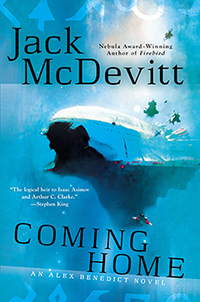 Being a fan of author Jack McDevitt, I was pleased to discover that I hadn’t picked up his two latest books, Starhawk and Coming Home. The former is his latest in the Priscilla Hutchins novels, while the latter is the latest of his Alex Benedict stories. I’d planned on doing a review of the books once I was done with them; but now that I am done, I’ve had second thoughts.
Being a fan of author Jack McDevitt, I was pleased to discover that I hadn’t picked up his two latest books, Starhawk and Coming Home. The former is his latest in the Priscilla Hutchins novels, while the latter is the latest of his Alex Benedict stories. I’d planned on doing a review of the books once I was done with them; but now that I am done, I’ve had second thoughts.
It’s not that I didn’t enjoy the novels. Yes, reading Starhawk threw me, because after six Priscilla Hutchins novels, McDevitt decided to write one about Hutch’s beginnings as a star pilot; and maybe because of that, the story didn’t seem to me to have any real stakes to it. And Coming Home, though it made me emotional in all the right places, seemed to have an oddly subdued tone, with the literary equivalent of the fourth wall being broken when Chase Kolpath told Alex Benedict that she was writing memoirs of their adventures… then threw an obvious bone at itself, when Chase found one of the rare books that had survived from our present era… and it happened to be a Priscilla Hutchins novel. So, maybe those issues distracted me from enjoying the books objectively enough to provide a review.
On the other hand, I’ve been trying to step up my promotion efforts for my own books, and having zero success… and that is beginning to color my judgement (specifically, a deep shade of black). I’ve become severely frustrated by the fact that I can’t get anyone to review my books, either at the sales sites or websites devoted to science fiction. I have been actively reconsidering my dedication to writing, even to leaving my books available for sale at all, and casting about for new ways to occupy my free time (right now, internet porn collecting is high on my admittedly short list).
And suddenly, I remembered the old adage: “Those who can, do. Those who can’t, teach.” And a little voice wanted to add a third line, to wit: “Those who can’t teach, review.“
So maybe it’s just because I’m in a lousy mood when it comes to science fiction right now, but I can’t help but feel like anything I might say about someone else’s novels—especially a successful published author’s novels—would only amount to sour grapes, meanly poking at the champion on his pedestal in the hope of revealing feet of clay to the world… and in doing so, somehow convince a non-existent audience that maybe I should be on that pedestal instead, with my nice, solid feet and my undiscovered genius…
Shyeah.
Anyway, I find that I can’t say anything about the books of one of my favorite authors, without their being an unintentional taint in there. So, no review from me. In fact, I guess I won’t be writing any more reviews of any novels, big-published or independent, favorite or popular, good or bad.
But that’s okay: If there’s one thing this world is full of, it’s people with opinions.











